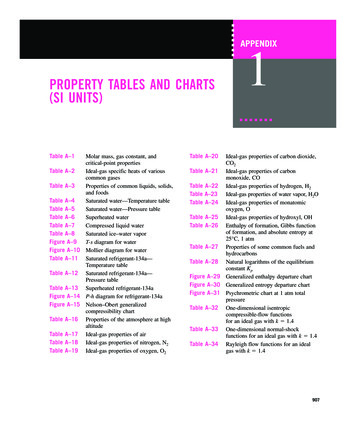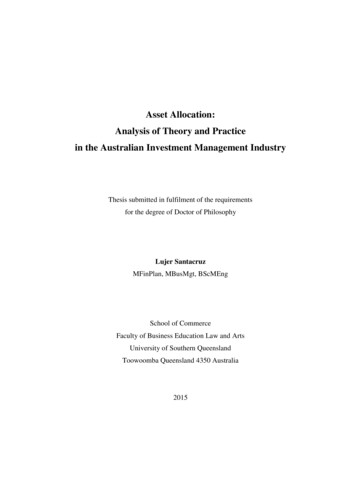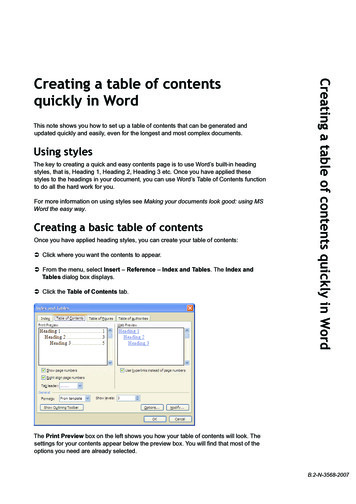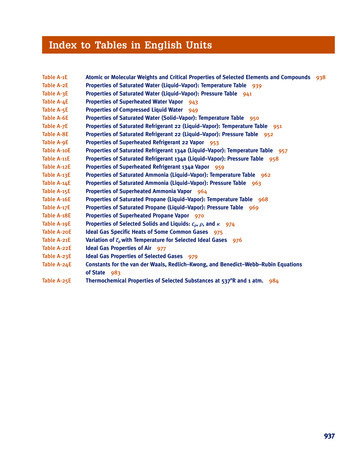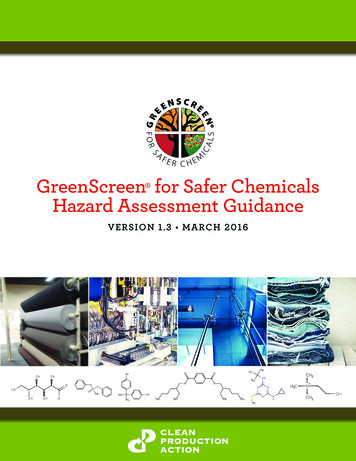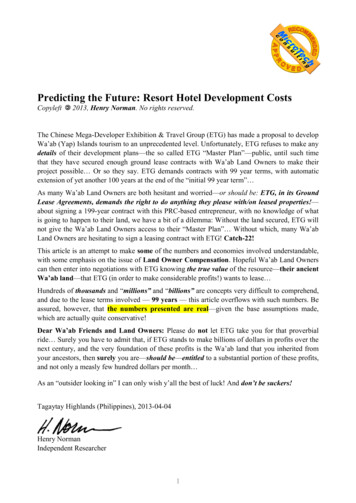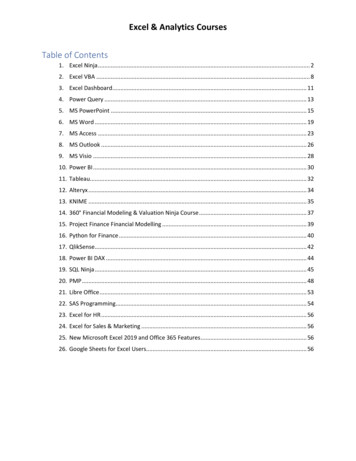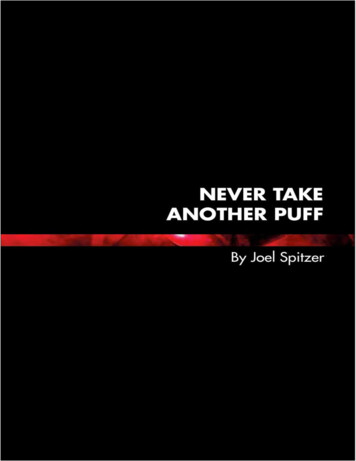
Transcription
Table of ContentsNever Take Another PuffAuthor’s Disclaimers and Use AuthorizationAbout the AuthorPrefaceChapter 1: Why Do People Continue to Smoke?You smoke because you’re a smoke-a-holic!Junkie, burn-out, addict, drug abuser, drunk, alcoholic, smoke-a-holic“Why do I smoke?”“I smoke because I like smoking!”“I have to smoke because of all my stress!”“I smoke because I’m self-destructive!”"How can I quit if I live with a smoker?""Why should I quit smoking?" "I could just get run over by a truck."The power of advertisingAre you smoking more and enjoying it less?A safer way to smoke“I’ve smoked for so long and so much, what is the use in quitting now?”Quitting smoking: a fate worse than death?“What a relief, I think I have cancer!”Quitting by gradual withdrawal“I can’t quit” or “I won’t quit”?How would you deal with the following situations?
“Why did I start smoking? Why did I quit?”Chapter 2: The Real Cost of SmokingMy Cigarette, My FriendReasons people want to quit smokingProud to be a smoker?The social toll of smokingSmokers need not apply!The isolation of a widowed smokerThe closet smokerMedical implications of smoking“So I can’t run marathons”“It’s only cigarette smoking - it’s not like a crime punishable by death”“Because now it really hurts!”Individual approaches used to motivate smokers to quitSmoking and circulationThe fan letterThe real cigarette induced "roller coaster" rideSmoking’s impact on the lungs“If cigarettes were as deadly as you claim they are, the government would not sellthem!”He will quit when he “bottoms out!”Chapter 3: How to Quit SmokingQuit smoking tip sheetQuit cold turkey!Setting quit dates
“I will quit when.”Take it ONE DAY AT A TIMEUsing deep breathing as a safe and effective quitting aid“I’m not going to smoke today!”"What should I do with my leftover cigarettes?"Finding cigarettesA 99.9% commitment to quit smoking will failEvery quit is differentAttitudeThe importance of the first three days of your quitMinimizing the most common side effects to quitting smokingPossible withdrawal symptomsWill this quit smoking symptom go away?Understanding the emotional loss experienced when quitting smokingNew reactions to anger as an ex-smokerSmoking triggersAvoiding triggersHow to do nothing without a cigaretteReplacing crutchesQuitting for others“Should I find a quit smoking buddy?”“I’m going to have to carry cigarettes with me at all times for me to quit smoking.”Can people quit smoking and still drink alcohol?Does everything smell and taste better after quitting?
Sleep adjustmentsThe smoking dreamPossible changes in caffeine toleranceMedication adjustments that may be necessary“I’m just too weak to quit smoking!”“My support group is responsible!”“I liked my other smoking clinic more!”Support group diversions“What should I call myself?”“How can I get my family and friends to quit smoking?”Can we motivate a smoker to quit if he thinks he doesn’t want to quit?The easy way out!Quitting methods - who to believe?Pharmacological crutchesPharmacological aids: prolonging withdrawal syndromesSo how did most successful ex-smokers actually quit smoking?40 years of progress?"Whatever you do don't quit smoking cold turkey!"Is cold turkey the only way to quit?“How does your program compare to.”Divine revelationsChapter 4: Relapse PreventionThe Smoker’s VowThe Law of Addiction
“Just one little puff?”The lucky ones get hooked!“Maybe I am different?”“Was I addicted?”Curiosity killed the quit“Everyone is different?”Fixating on a cigarette“You said it would get better. It’s just as bad as the day I quit smoking!”The urge hitsThoughts that seem worse than urges experienced the first few daysDying for a cigaretteNegative support from othersWords that translate to "RELAPSE"“You know smoking two or three cigarettes is better than having smoked two orthree packs!”"Well, at least I attempted to quit smoking. That is better than not trying at all."“I feel 100% better since I quit”“Why are you so hard on the concept of cheating?”"I think I have decided to go back to smoking"The smell of relapse“The only time I think of cigarettes is when I receive one of your stupid letters!”The fallacy of "good cigarettes"Your New Year’s quit smoking resolution“If they ever cure lung cancer, I would go back to smoking.”"I made a conscious decision to smoke"
“I went back to smoking when I was in the hospital with pneumonia.”We understand why you relapsedComplacency“Things were just so bad at work that I took a cigarette!”"Help Me, I've relapsed!" A plea for help or a cry for attention?Come share your strength, come recognize your vulnerabilities“Never Take Another Puff!”Chapter 5: Weight Gain & ControlMinimizing the weight gained from quitting smoking“I’ve tried everything to lose weight but nothing works!”“I would rather be a little overweight and not smoking than underweight and dead.”“I will stop smoking after I lose weight”Chapter 6: Smoking PreventionFrightening trends in teenage smokingWhat can we do to stop the rise of teen smoking?“Thank goodness it’s only cigarette smoking!”Kids Just Don’t Get It!Why I don’t speak at more sites on how to help people quit smoking.Chapter 7: Smoking, a Historical PerspectiveWhen smoking was a “choice addiction”“How did we survive back then?”The right to smoke in public“I am a smoker!”
Never Take Another PuffBy Joel SpitzerCopyright Joel Spitzer, 20033rd Edition: December 26, 2021NTAP’s Online HomeNTAP is available in the following formats:EPUBPDFMOBIWORDAZW3Please share NTAP!
Author’s Disclaimers and Use AuthorizationCopyright Joel Spitzer, 2003. This book or any portion thereof may be freelydistributed in either electronic or print form so long as no charge is made for it, and solong as this notice remains with any significant portion of the book when distributed.Joel Spitzer and WhyQuit.com are not affiliated with any product or service, nor do theyendorse any service or product. It is our belief that a person does not need to spend anymoney in order to break free from nicotine. It is our belief that people do not need to behypnotized, acupunctured, lasered, patched, gummed, vaped, lozenged, take bupropion,varenicline or any vitamin or supplement, or use any other product or procedure to quitsmoking.Joel Spitzer and WhyQuit.com provide all information totally free of charge. Our workmay not be used to endorse any quitting product and service. Those marketing quittingproducts and services do at times approach us for consent to share our materials. Weallow our materials to be distributed for the benefit of individual quitters but they mustbe distributed totally free of charge, without solicitation or donation requests, there canbe no mention of any quitting service or product on any page of our materials, anyreproduction must contain our copyrights, this disclaimer must be included in full, andsharing our materials should in no way be construed as an endorsement of any productor service.Please contact us at john@whyquit.com if any handout or publication is found tocontain product or service information, or if these materials were used to market orpromote any fee based product or service. Specific complaints will result in permanentrevocation of permission for the offending business to distribute our materials.Our literature is designed to support, not replace, the relationship that exists between areader and his/her physician. Do not rely upon any information in this quitting literatureto replace individual consultations with your doctor or other qualified health careprovider.
About the AuthorAmerica's most accomplished stop smoking educator, Joel Spitzer devoted nearly 50years (1971-2020) toward helping smokers quit and youth smoking prevention.Far from following and teaching the commonly held beliefs of the day, Joel recognizedas early as 1976 that nicotine was an addiction. Then, nearly the entire medical andscientific community, including the U.S. Surgeon General (see paragraph 5), contendedthat smoking was simply a habit.Joel's early insights allowed him to develop and present nicotine dependencyintervention strategies that were years ahead of their time. As a result, participants inhis clinics experienced success at rates significantly higher than the national averagefor such programs.What started as an eight-grader's 1970 school project on the dangers of smokingresulted in Joel becoming a volunteer smoking prevention speaker for the AmericanCancer Society in 1971. In 1976 he was hired by the American Cancer Society as part ofits professional staff. This link is to the story of how a 14 year-old never-smoker namedJoel started reaching out to much older smokers.Joel left the American Cancer Society in 1978 to become the smoking programscoordinator for the Good Health Program of Skokie Valley Community Hospital, whichlater became the Rush North Shore Medical Center in Skokie, Illinois, where he serveduntil 2000. He remained a volunteer speaker for the ACS during his 22 years with thehospital.Joel became a consultant to the Evanston Department of Health and Human Services(2000 to 2008) and to the Skokie Illinois Health Department (2000 to 2007). There, heprovided state-funded smoking cessation clinics and seminars for the two Chicagosuburban communities.Joel served as education director of WhyQuit.com from 2000-2010 and then as aconsultant from 2011-2020. He also served as a manager of Freedom, an MSN and then
Yuku based quit smoking support group (2000-2006). It was during these 20 years thatworldwide sharing of Joel's insights and lessons exploded.All of Joel's online work was pro bono. He never received any income, fees, ordonations, either direct or otherwise (see WhyQuit's Financial Disclosure). Also, 100% ofhis materials were free. In all, Joel conducted 690 single-session seminars and 350 sixsession, 13-day stop smoking clinics between 1972 and 2008.The Babe Ruth of quitting, Joel is a contender for the most live programs ever, the mostdays presenting live programs, and the number of years devoted full-time to dailyworking with smokers and quitters. While more than 100,000 attended Joel's liveprograms, tens of millions have been touched by his online work.Joel wrote 96 articles that were intended as follow-up reinforcement lessons which hemailed to his stop smoking clinic participants. Since 2000, those articles and Joel'sgrowing body of work have been available for free within "Joel's Library" at WhyQuit.In 2003, Bill W (Gold) compiled Joel’s reinforcement articles into this free e-book that heentitled "Never Take Another Puff" (NTAP).In 2006, NTAP was revised to add 3 new articles. Since 2003, Never Take Another Puffhas experienced millions of downloads.In October of 2006, a new recovery tool was added to Joel's Library, Joel's stop smokingvideo collection. Joel's video collection now numbers nearly 500. In 2017, the collectionwas page formatted and indexed, allowing for easy sharing of related content and links.This is the 3rd edition of NTAP.While reformatting and updating the book in December 2021, we included links to boththe online version of Joel’s articles and to related video pages. Linked videos introducealternate learning paths, plus they share links to related topics.The 3rd edition also includes 30 additional articles addressing important topics notcovered by the original reinforcement letters. As Joel explains in this new video, someof the new articles were not written by Joel but were created using transcripts of hisvideos. As a result, they were not edited and have a more conversational tone.While Joel retired from service on December 26, 2020, with the neo-nicotine industryattempting to redefine “quitting” and “cold turkey” so as to protect continued nicotineuse, his five decades of insights are more valuable today than ever. If you’d like to seeJoel’s lessons in action, visit Turkeyville on Facebook, home to nearly 15,000 cold turkeyquitters!WhyQuit and Joel's students continue sharing his core lessons with quitters around theglobe, including volunteers having translated portions of his work into 11 differentlanguages.
Million of words during a half-century of service, Joel's most shared lesson is easilystated in a few words, that it’s impossible to relapse so long as all nicotine remains onthe outside, so long as we remain loyal to our original commitment to Never TakeAnother Puff!John R. PolitoNicotine Cessation Educator
PrefaceNever take another puff. It seems so simple. If you want to quit smoking all you need todo is to never take another puff. There you have it—a roadmap for breaking free fromone of the deadliest scourges ever to hit mankind.Nearly five million people a year die from smoking. Many knew the dangers and wantedto quit but didn’t feel as if they knew how to break away from such a complicated andpowerful addiction. Truth be known, this is not a complicated addiction and while on thesurface it may seem powerful, in truth, it is not.Yes there are lots and lots of people who smoke until it kills them but it is not that theycouldn’t quit. It’s that they didn’t have the understanding of what was needed to quit,and more importantly, what they needed to do to stay quit. Again, the answer to both isto never take another puff.Anyone who goes through the trouble of reading this book is going to see that phrase alot. While it may sound repetitive to the point of being annoying, it is the one key pieceof information that will secure your quit.This series of short articles, exploring different smoking issues, was written over atwenty-two year period. They were not written to be a “how to” manual for quitting, butas follow-up reinforcement to support those who had already quit smoking throughclinics I had conducted, to remind them of the importance of remaining vigilant in orderto stay free.While they were not intended to be a “how to” manual, when compiled and organized asthey are here, they may very well serve as an empowering tool to help you learn how tojoin the ranks of the millions of successful ex-smokers alive today. The more you readthe more you will understand why you smoke and why you should quit.You will also begin to grasp how your life can change by quitting. After spending a fewminutes reading any article that touches on some aspect of smoking pertinent to you,you will arrive at a sentence spelling out what you need to do to remain free today.Make it through to the end and you will have all the understanding and tools in place tomake a commitment that can preserve your health and likely save your life. You willunderstand that all you need to do to stay smoke-free is to Never Take Another Puff!Joel
Chapter 1: Why Do People Continue to Smoke?You smoke because you’re a smoke-a-holic!Some smokers say they smoke because they are nervous. Others say they smoke tocelebrate. Some think they smoke for energy. Many smoke to look sexy. Yet otherssmoke to stay awake or to sleep. Some think they smoke to think. One truly uniquesmoker once told me she smoked to breathe better. Another once said she returned tosmoking when experiencing chest pains. She figured the fear of a heart attack isenough to make anyone smoke.None of these reasons satisfactorily explains why people continue smoking. However,the answer is, in fact, quite simple. Smokers smoke cigarettes because they aresmokers. More precisely, smokers smoke cigarettes because they are smoke-a-holics.A smoke-a-holic, like any other drug addict, has become hooked on a chemicalsubstance. In the cigarette smoker’s case, nicotine is the culprit. He is at the pointwhere the failure to maintain a minimum level of nicotine in his blood stream leads tothe nicotine abstinence syndrome, otherwise known as drug withdrawal. Anything thatmakes him lose nicotine makes him smoke.This concept explains why so many smokers feel they smoke under stress. Stress has aphysiological effect on the body which makes the urine acidic. Whenever the urinebecomes acidic, the body excretes nicotine at an accelerated rate. Thus, when a smokerencounters a stressful situation he loses nicotine and goes into drug withdrawal.Most smokers feel that when they are nervous or upset cigarettes help calm themdown. The calming effect, however, is not relief from the emotional strain of thesituation, but actually the effect of replenishing the nicotine supply and ending thewithdrawal. It is easy to understand why smokers without this basic knowledge ofstress and its nicotine effect are afraid to give up smoking. They feel that they will begiving up a very effective stress management technique.But once they give up smoking for a short period of time, they will become calmer, evenunder stress, than when they were smokers.The explanation of how physiological changes in the body make smokers smoke isdifficult for some smokers to believe. But nearly all smokers can easily relate to othersituations which also alter the excretion rate of nicotine.Ask a smoker what happens to their smoking consumption after drinking alcohol, andyou can be sure they will answer that it goes up. If asked how much their consumptionrises, they will normally reply that it doubles or even triples when drinking.
They usually are convinced that this happens because everyone around them issmoking. But if they think back to a time when they were the only smoker in the room,they will realize that drinking still caused them to smoke more.Alcohol consumption results in the same physiological effect as stress - acidification ofthe urine. The nicotine level drops dramatically, and the smoker must light one cigaretteafter another or suffer drug withdrawal.It is important for smokers considering quitting to understand these concepts becauseonce they truly understand why they smoke they will be able to more fully appreciatehow much more simple their life will become as an ex-smoker.Once the smoker stops, nicotine will begin to leave his or her body and within two weeksall the nicotine will be gone. Once the nicotine is totally out of the body, all withdrawalwill cease. No longer will they experience drug withdrawal states wheneverencountering stress, drinking, or just going too long without smoking.In short, they will soon realize that all the benefits they thought they derived fromsmoking were false effects. They did not need to smoke to deal with stress, or to drink,socialize, or work. Everything they did as a smoker they can do as a non-smoker, and inmost cases they will now do these activities more efficiently and feel better duringthem.They will become a more independent people. It is a good feeling and a majoraccomplishment to break free from this addiction. But no matter how long they are offsmoking and how confident they feel, the ex-smoker must always remember that he orshe is a smoke-a-holic.Being a smoke-a-holic means that as long as they don’t take a single drag off acigarette, cigar or pipe, or chew tobacco, or inject it into their bloodstream with asyringe, they will never again become hooked on nicotine.If, on the other hand, they do make the tragic mistake of experimenting with any nicotineproduct, they will reinforce their addiction. This will result either in returning to their oldlevel of consumption or experiencing a full fledged withdrawal process. Neithersituation is fun to go through.So, once off of smoking, the ex-smoker must always remember just who and what he is,a smoke-a-holic for the rest of his life. Remembering this, you can remain trulyindependent from nicotine by following one simple practice - Never Take Another Puff!(1983) Article Video
Junkie, burn-out, addict, drug abuser, drunk, alcoholic, smoke-aholicSome people would argue that smoke-a-holic is just a cute euphemism which shouldnot be compared to what they consider degrading syndromes. Contrary to this belief,nicotine addiction can be equally as strong and deadly as any of these other conditions.In fact, if you total the number of people who die yearly of all these other conditionscombined, they would not add up to the number of premature deaths attributed tocigarette smoking.Until recent times, the idea of nicotine being a physiologically addictive substance wascontroversial in the world-wide medical community. For a drug to be consideredaddictive, it must meet certain criteria. First, it must be capable of inducing physicalwithdrawal upon cessation. Nicotine abstinence syndrome is a well documented,established fact.Second, tolerance to the drug usually develops. Increasingly larger doses becomenecessary to achieve the same desired effects.Smokers experience this phenomenon as their cigarette consumption graduallyincreases from what probably was sporadic occasional use to a required dailyconsumption of one or more packs.The third criterion is that an addictive substance becomes a totally consumingnecessity to its user, usually resulting in what is considered by a society as anti-socialbehavior. Many have argued that cigarette smoking fails to fulfill this requirement.True, most smokers do not resort to deviant behaviors to maintain their dependency,but this is because most smokers do manage to easily obtain the full complement ofcigarettes they need to satisfy the addiction. When smokers are deprived of easyaccessibility to cigarettes, the situation is totally different.During World War II, in concentration camps in Germany, prisoners were not givenenough food to fulfill minimum caloric nutritional requirements. They were literallystarving to death. A common practice among smoking prisoners was to trade awaytheir scarce supplies of life sustaining food for cigarettes.Even today, in underdeveloped countries, such as Bangladesh, parents with starvingchildren barter away essential food for cigarettes. This is not normal behavior.During the “stop smoking clinics” I conduct, numerous participants admit to goingthrough ashtrays, garbage cans and, if necessary, gutters looking for butts which maystill have a salvageable value of a few puffs when their own supplies are depleted dueto carelessness or unforeseen circumstances.
To them, it is sick to think that they ever performed such a grotesque act, but manyrealize that if they were currently smoking and again caught in a similar predicament,they would be fully capable of repeating the repulsive incident.Nicotine is a drug. It is addictive. And if you let it, it can be a killer. Consider this whenyou get the urge for a cigarette. One puff can and most often will reinforce theaddiction. Don’t take that chance. Remember - Never Take Another Puff! (1982) Article Video“Why do I smoke?”Most smokers spend countless hours during their smoking careers trying tosatisfactorily answer this most perplexing question.Typically, answers they come up with are that they smoke because they are unhappy,unsatisfied, nervous, bored, anxious, lonely, tired or just frustrated without theircigarettes. Other reasons often quoted are that cigarettes keep them thin, make thembetter able to think, or that they are more sociable while smoking.Some claim that they smoke to celebrate the joyful times of life. Food, drink, fun andgames, and even sex all seem to lose their appeal without an accompanying cigarette.After hearing all of these wonderful qualities attributed to cigarette smoking, I findmyself amazed that over one billion of earth’s inhabitants have successfully given upsmoking.What in the world is wrong with these ex-smokers? I can understand people who neversmoked. They never knew or believed all of these wonderful benefits derived fromsmoking. What you never had you’ll never miss. But these ex-smokers, having given upsuch a marvelous chemical addiction with so many benefits, must be crazy.The fact is, ex-smokers are not crazy. To the contrary, it was their ability to be rationalwhich enabled them to successfully break free from cigarettes. They had the foresightto put themselves through the pain and agony encountered during the initial withdrawalfrom the nicotine addiction.It is both a powerful physical and psychological addiction which creates many irrationalbeliefs as defense mechanisms in order to perpetuate the smoking behavior. Most ofthe reasons mentioned above of why smokers claim they smoke are such drug inducedbeliefs.All ex-smokers should be applauded for their great accomplishment in overcoming themany obstacles created by their addiction. Encountering the initial quitting processcreates a state of emotional insecurity and self doubt. Will they ever be able to survivein our complicated world without their cigarettes?
Once they become totally free of the grip which cigarettes exert upon them, they will beable to get a clear perspective of how many misconceptions they had about the benefitsthey thought they derived from smoking.Being drug free after years of enslavement brings a sense of relief and accomplishmentthat the smoker never anticipated. To their pleasant surprise, they discover themarvelous fact that there is life after smoking.It is a healthier, calmer and more pleasant life. They now have a choice as to whether ornot they ever wish to smoke again. If they look honestly and objectively at theadvantages and disadvantages, the logical choice is to remain ex-smokers.Unfortunately, some don’t remember all of the consequences associated with their nowarrested dependency, but only recall the infrequent good times they believe they hadwith their cigarettes. They think that they could once again enjoy just a few cigarettes.What must be understood by all ex-smokers is that they only have two options. Theycan smoke nothing or they can smoke at their previous level of consumption. There isno in-between. They are wasting their time contemplating how nice it would be to be anoccasional social smoker. They can never again have that luxury.All ex-smokers must consider both options. Then if they choose to smoke, all they needdo is take their first cigarette and again become trapped in the nicotine addiction. If theychoose to remain free, all they need is to follow the simple practice - Never TakeAnother Puff! (1983) Article Video“I smoke because I like smoking!”Ask almost any current smoker why she continues to indulge in such a dangerousactivity and she will normally reply, “Because I like smoking.” While she may say this inall honesty, it is a very misleading statement, both to the listener and to the smokerherself.She does not smoke because she enjoys smoking, rather she smokes because shedoes not enjoy not smoking.Nicotine is a powerfully addictive drug. The smoker is in a constant battle to maintain anarrow range of nicotine in her blood stream (serum nicotine level). Every time thesmoker’s serum nicotine level falls below the minimum limit, she experiences drugwithdrawal.She becomes tense, irritable, anxious and, in some cases, even shows physicalsymptoms. She does not enjoy feeling these withdrawals. The only thing that willalleviate these acute symptoms will be a cigarette. The nicotine loss is then replenishedand, hence, the smoker feels better. She enjoyed smoking.
A smoker must also be cautious not to exceed his upper limit of tolerance for nicotineor else suffer varying degrees of nicotine poisoning. Many smokers can attest to thiscondition. It usually occurs after parties or extremely tense situations when the smokersfinds themselves exceeding their normal level of consumption. They feel sick,nauseous, dizzy and generally miserable.Being a successful smoker is like being an accomplished tightrope walker. The smokermust constantly maintain a balance between these two painful extremes of too much ortoo little nicotine. The fear which accompanies initial smoking cessation is that the restof the ex-smoker’s entire life will be as horrible as the first few days without cigarettes.What ex-smokers will learn is that within a short period of time, the physical withdrawalwill start to diminish. First, the urges will weaken in intensity and then become shorter induration. There will be longer time intervals between urges. It will eventually reach thepoint where the ex-smoker will desire a cigarette very infrequently, if ever. Those whocontinue to smoke will continue to be in a constant battle of maintaining their serumnicotine level.Included in this battle is the great expense of buying pack after pack and the dangerousassault on the smoker’s body of inhaling the poison nicotine along with over 4,000 othertoxic chemicals which comprise the tars and gasses produced from the combustion oftobacco. These chemicals are deadly by themselves and even more so in combination.So the next time you think of how much you once seemed to enjoy cigarettes, sit backand take a serious, objective look at why you have such an idealization of thisdangerous product. Consider all the consequences. You will probably realize that youfeel physically and mentally better now than you ever did as a smoker. Consider all ofthis and - Never Take Another Puff! (1983) Article Video“I have to smoke because of all my stress!”Stress is considered a cause for smoking by many people. Actually, smoking is a causeof stress. Recent correspondence dealt with reasons people give for going back tosmoking: social situations, parties, alcohol consumption and stress. This month I wishto amplify on stress.In January of 1979, Chicago and vicinity was devastated by a major blizzard. Heavysnows fell just after the New Year crippling the area. Additional snowfall continuedthroughout the week. During this time period I was barraged with phone calls fromparticipants of the November, 1978 clinic claiming to be terribly nervous, upset andanxious from “not smoking.”Curiously, most of them were feeling well during the month of December. They hadoccasional urges which lasted only seconds and were quite easy to overcome. Whatthey were experiencing in January was different.
Many felt that they were on the verge of cracking up. To
“How can I get my family and friends to quit smoking?” Can we motivate a smoker to quit if he thinks he doesn’t want to quit? The easy way out! Quitting methods - who to believe? Pharmacological crutches Pharmacological aids: prolonging withdrawal syndromes So how did most successful ex-smokers actu

